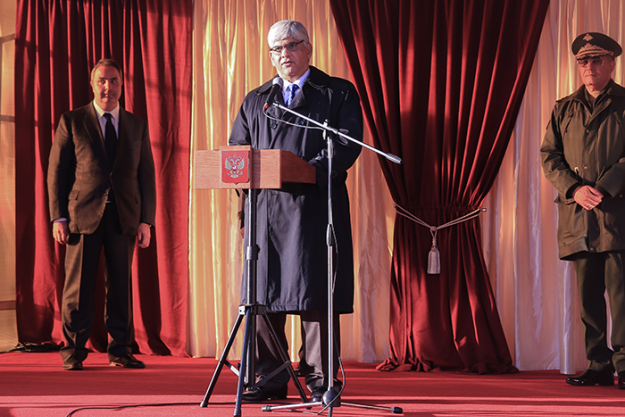
OPCW Deputy Director-General Hamid Ali Rao speaking at a ceremony on the completion of operations at the Kizner Chemical Weapons Destruction Facility in the Udmurt Republic. This also marks the completion of the full destruction of the 39,967 metric tons of chemical weapons that had been possessed by the Russian Federation.
THE HAGUE, Netherlands – 29 September 2017 – At the invitation of the Government of the Russian Federation, Deputy Director-General Hamid Ali Rao, on behalf of the OPCW, participated today in a ceremony on the completion of operations at the Kizner Chemical Weapons Destruction Facility in the Udmurt Republic. This also marks the completion of the full destruction of the 39,967 metric tons of chemical weapons that had been possessed by the Russian Federation.
The Deputy Director-General attended a video conference with President of the Russian Federation, H.E. Mr Vladimir Putin; together with Presidential Envoy to the Volga Federal District and Chairman of the State Commission for Chemical Disarmament, Mr Mikhail Babich; Minister of Industry and Trade, Mr Denis Manturov; and the Head of the Federal Directorate for Safe Storage and Disposal of Chemical Weapons, General Valery Kapashin.
The Closing Ceremony at Kizner was attended by high-ranking officials and representatives of the State Commission for Chemical Disarmament and various ministries and agencies of the Russian Federation. Also present were representatives of the States Parties that assisted the Russian Federation with its destruction programme.
Ambassador Rao acknowledged the efforts of the Russian Government to destroy its entire stockpile in a safe and efficient manner. He also recognised the important financial and in-kind contributions made by other OPCW Member States in support of these efforts.
Since this facility was commissioned in December 2013, a dedicated team of specialists and support staff from both the Russian facility personnel and Technical Secretariat have carried out the challenging task of destroying and then verifying a large portion of Russia’s chemical weapons legacy, more than 5,745 metric tonnes of chemical agents, including sarin, soman, VX and lewisite were rendered unusable in Kizner. This facility was responsible for the destruction of almost 2,187,000 munitions in various calibres.
With the completion of Russian chemical weapon destruction activities at Kizner, 96.3 per cent of all chemical weapon stockpiles declared by possessor States have been destroyed under OPCW verification. For its extensive efforts in eliminating chemical weapons, the OPCW received the 2013 Nobel Prize for Peace.
Background
As the implementing body for the Chemical Weapons Convention, the OPCW oversees the global endeavour to permanently eliminate chemical weapons. Since the Convention’s entry into force in 1997 – with its 192 States Parties – it is the most successful disarmament treaty eliminating an entire class of weapons of mass destruction.
More Information
- Ceremony marking the closure of Kizner Chemical Weapons Destruction Facility Remarks by H.E. Ambassador Hamid Ali Rao, Deputy Director-General, OPCW Udmurt Republic, Russian Federation 27 September 2017
- Seventeenth Induction Workshop for Diplomatic Personnel Involved in the Work of the OPCW Closing remarks by Deputy Director-General H.E. Ambassador Hamid Ali Rao The Hague, the Netherlands 29 September 2017
- OPCW Fact Sheets
